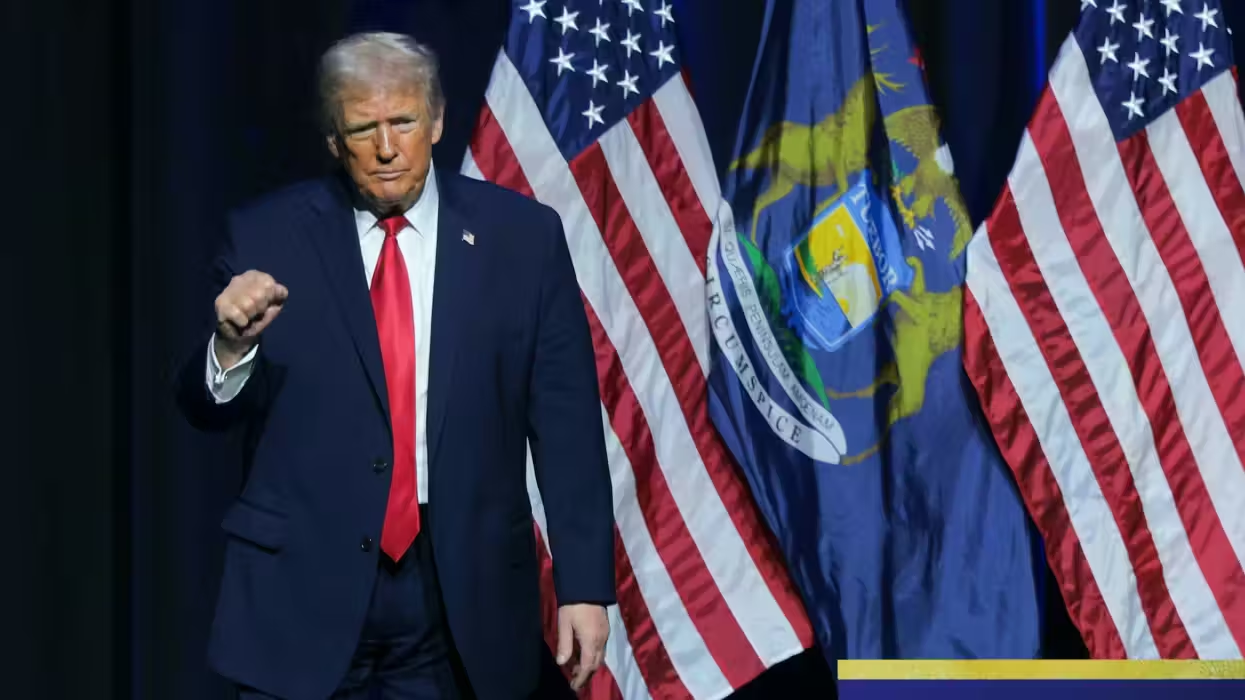
© 2026 Blaze Media LLC. All rights reserved.
One senator's simple reform that would shrink the federal budget by one-sixth -- and why he believes it can pass
December 11, 2014
This proposal will "appall the political establishment and the private interests that benefit from [it]"
James Buckley, former U.S. senator from New York of the Conservative Party (also the first and only senator ever elected from the Conservative Party), under secretary of state during the Reagan and Bush administrations, federal judge, and the Buckley in the landmark campaign finance decision, Buckley v. Valeo, has a plan that could singlehandedly shrink the federal budget by one-sixth, restore the balance of federalism and Constitutional order, return power to the states and the people, and in the process improve the services provided to taxpayers.
The novel idea to achieve these ends is the subject of his slender but insightful new book, "Saving Congress from Itself: Emancipating the States and Empowering Their People," and it is as follows: eliminate all federal grants-in-aid.
 James Buckley pictured during a campaign commercial during his successful 1970 run for U.S. Senate. (Image Source: YouTube screengrab)
James Buckley pictured during a campaign commercial during his successful 1970 run for U.S. Senate. (Image Source: YouTube screengrab)
What are grants-in-aid, and why in the world would members of Congress cede control of 17% of the federal budget and with it a substantial portion of their power?
Grants-in-aid are federal expenditures doled out to states for projects ranging from road construction and maintenance, to assistance for the poor and education, as well as a number of arguably more questionable causes, many of which can be found in Senator Tom Coburn's annual "Wastebook."
Buckley writes:
The vast majority of federal grants...deal with needs that are generally accepted as important...But others, such as the one that would widen sidewalks to fight juvenile obesity [a $430,000 grant to a town in Buckley's home state of Connecticut from the Federal Safe Routes to School Program in order to entice children to walk or bike to school], illustrate Congress's incurable temptation to propose a federal solution to any problem or need, however parochial.That temptation is as old as the Republic.
[instory-book ISBN="9781594037740"]
As Buckley lays out in his book, like so many powers before it, the federal government largely shunned the use of grants-in-aid (save for those directed toward education), adhering to an expansive reading of the Tenth Amendment and narrow reading of the Spending and Commerce Clauses, until a series of court decisions during the Depression made legitimate their use, and President Lyndon Johnson made them widespread under his Great Society program.
To give you a sense as to their explosion in the ensuing decades, in 1970, grants-in-aid totaled $24.1bn. In 2010 they totaled $608.4bn, 17% of that year's federal budget, and the third largest category of all federal expenditures behind entitlements and defense.
In addition to direct monetary costs, there are many other costs both seen and unseen that such grants impose on the states and Congress, which Buckley convincingly argues far outweigh their benefits quantitatively and qualitatively, to the detriment of the people.
Buckley writes:
[T]he most costly and least efficient way to build a country road or provide medical care for the poor is to entrust fundamental decision-making tasks to officials who are the farthest removed from the work site or clinic. Yet the creation and nurture of grants-in-aid programs has become a brutally expensive addiction...It is a win-win game [for a congressman]--except for the taxpayers who have to foot the bill and the mayor who would rather have spent his city's funds on more pressing needs.Those programs' costs in dollars, costs in misdirected priorities, costs in overlapping administration, costs in rigid one-size-fits-all regulations, and the citizens' loss of control over government actions that most directly affect them should satisfy any objective observer that they represent the most misguided means of providing public services that lie within the states' acknowledged areas of competence. It is time that Congress kicked the habit.
Were the federal government to abolish all federal programs that offer grants to states and their subdivisions, in a process that Buckley believes could be implemented over a five or six year period to allow states to adjust their laws in accord with the reduction in federal funds flowing into their coffers, the author notes:
[I]t will reduce federal spending by more than one-sixth and eliminate a major diversion of congressional time and energy from such trivia as balancing the federal budget, reforming entitlement and tax laws, and bringing runaway bureaucracies under some degree of control. It will also liberate the state officials from federal regulations that increase the cost and decrease the effectiveness of their work, and enable our citizens to regain control over governmental actions that most directly affect them.
While on its face this may sound attractive, the rightfully cynical reader might ask, how could such legislation ever pass Congress? Why would public officials ever vote away their own power?
Lest you think the former senator and federal appeals judge is naive, Buckley readily asserts that
[sharequote align="center"]"[M]y call for the abolition of all federal grants-in-aid programs threatens so many...interests"[/sharequote]
[T]he political establishment will find it [Buckley's plan] as outrageous as [Jonathan] Swift's ["Modest Proposal"] because my call for the abolition of all federal grants-in-aid programs threatens so many of their interests. It will deny members of Congress their easiest paths to reelection, threaten the jobs of the thousands of employees of the federal agencies and bureaus that oversee the programs, deprive governors and mayors of their readiest access to funds they don't have to raise from their own taxpayers, and distress the hordes of special interests that rely on the programs to impose their goals on state and local governments.
One of Buckley's refrains worthy of repeat is that "an aroused electorate is capable of political miracles."
In the case of his proposal, he believes it would have broad enough appeal -- if widely disseminated and debated -- to stir the American people and compel Congress to act. He believes that Americans will be attracted to such a plan "as taxpayers because of its demonstrable savings at both the federal and state levels, and as citizens because it will return so many decisions on public policy and expenditures to levels of government over which they have the greatest control."
He lays out just why this plan would be so compelling to even the most disengaged citizens in a single page of commonsense bullets.
[sharequote align="center"]"an aroused electorate is capable of political miracles"[/sharequote]
And he notes that while his plan may "appall the political establishment and the private interests that benefit from grants-in-aid programs," recent similar proposals from the right-leaning American Enterprise Institute and left-leaning Brooking Institute, along with general dissatisfaction with the political establishment, suggest that its timing may be just right.
For this author's money, any plan that appalls the political establishment and its rent-seeking beneficiaries is something worthy of consideration. And if such a plan restores the balance of federalism with states as laboratories of experimentation, shrinks the federal budget and improves services to the public, all the better.
Buckley later proposes several other worthy ancillary plans to further constrain government, return power to the people, and for which he feels the political appetite might just exist for there to be a fighting chance as to their passage.
As is the hallmark of clear thinking and wisdom, Buckley's book is a simple 81-page volume. But in those 81 pages it packs essential insight into Republican government and the American system, from the theoretical perspective of a student of the founding, jurisprudence and Constitution, and practical one as a legislator and judge.
This author highly recommends "Saving Congress from Itself" for anyone concerned with the trajectory of the Republic, and even those wholly unaware of the challenges she faces.
Editor's Note: We discussed this and other books on Pure Opelka, beginning at around 12:55 below.
Note: The links to the book in this post will give you an option to elect to donate a percentage of the proceeds from the sale to a charity of your choice. Mercury One, the charity founded by TheBlaze’s Glenn Beck, is one of the options. Donations to Mercury One go towards efforts such as disaster relief, support for education, support for Israel and support for veterans and our military. You can read more about Amazon Smile and Mercury One here.
–
Follow Ben Weingarten (@bhweingarten) and TheBlazeBooks on Twitter and Facebook.
You can find all of our Blaze Books interviews on Soundcloud and Stitcher, and subscribe to our podcast automatically via iTunes.
Want to leave a tip?
We answer to you. Help keep our content free of advertisers and big tech censorship by leaving a tip today.
Want to join the conversation?
Already a subscriber?
Ben Weingarten is a writer, commentator, and editor at large at RealClearInvestigations. He is a senior contributor at the Federalist and writes columns for Newsweek and the Epoch Times.
Ben Weingarten
Ben Weingarten is a writer, commentator, and editor at large at RealClearInvestigations. He is a senior contributor at the Federalist and writes columns for Newsweek and the Epoch Times.
more stories
Sign up for the Blaze newsletter
By signing up, you agree to our Privacy Policy and Terms of Use, and agree to receive content that may sometimes include advertisements. You may opt out at any time.
Related Content
© 2026 Blaze Media LLC. All rights reserved.
Get the stories that matter most delivered directly to your inbox.
By signing up, you agree to our Privacy Policy and Terms of Use, and agree to receive content that may sometimes include advertisements. You may opt out at any time.






